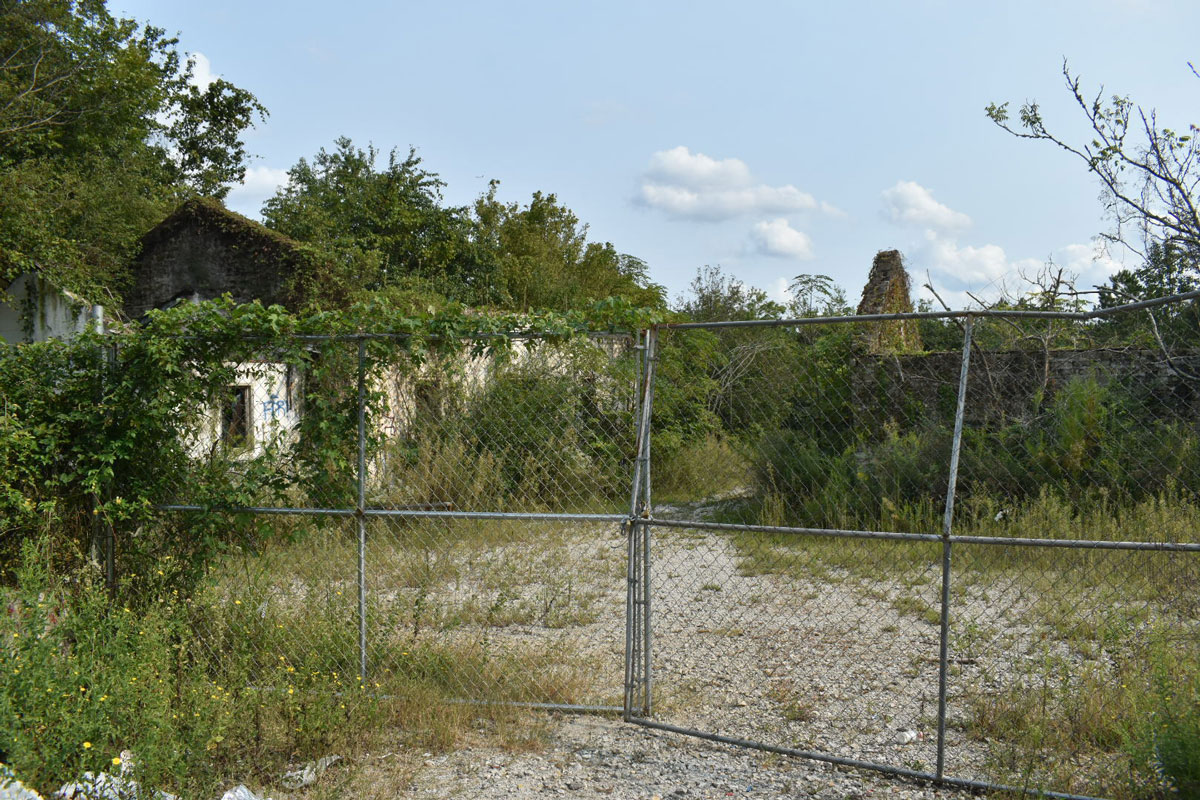
Photograph by Sam Worley
What’s with all the noise about the police training facility?
Last Wednesday night, the Atlanta City Council voted 10 to 4 in favor of a proposal to build a training center for police and firefighters on 85 acres of land in south DeKalb County. The vote came amid fierce controversy and followed 17 hours of public comment, with more than twice as many speakers coming out against the proposal than for it, according to one tally. Both Mayor Keisha Lance Bottoms and Governor Brian Kemp supported the plan, in which the city would lease the land—previously the site of a city-run prison farm along Key Road—to the nonprofit Atlanta Police Foundation for the construction of a $90 million facility; it is opposed by a variety of community groups, from neighborhood associations in nearby Grant Park and East Lake to the South River Forest Coalition to the Southern Center for Human Rights. Opponents dubbed the project—which would incorporate a mock village, firing and explosive ranges, and a driving course for emergency vehicles—“Cop City.”
Why the opposition?
Take your pick: Police critics and racial justice activists take issue with the construction of a lavishly funded law enforcement facility “after a year of uprisings in which ATL residents were teargassed, tased, and shot with rubber bullets by APD.” Local advocates worry that the destruction of forest and wetlands could lead to more flooding and worse air quality in surrounding, mostly Black and lower-income neighborhoods in Southeast Atlanta; environmentalists, including the Georgia chapter of the Nature Conservancy and Sunrise Movement, also object to the razing of 85 acres of trees in the context of the climate emergency, when forests can play a crucial cooling function. Urban planners, including BeltLine designer Ryan Gravel, point out that the facility disrupts another, previous plan for the South River Forest, a 3,500-acre tract of greenspace that is, as Gravel wrote, “metro Atlanta’s last chance for a park of this size inside our perimeter highway.” (More on that below.)
It’s unclear the extent to which the four councilmembers who voted against the plan on Wednesday shared these concerns; they largely took issue with the process, which Councilmember Jennifer Ide described as “incredibly bad,” also citing environmental concerns. Councilmember Natalyn Archibong, currently running for council president, said that when the Atlanta Police Foundation approached her in 2017 about the possibility of a new training facility, she urged the group to seek public input: “And instead of heeding my recommendation, it was ignored.” The proposal was unveiled publicly in April, with protests heating up over the summer; the council vote was initially scheduled for August, then delayed three weeks to accommodate more public comment.
What are the mechanics of this plan, and who’s behind it?
The idea is for the city, which owns the land in question in unincorporated DeKalb County, to lease it for construction to the Atlanta Police Foundation, a nonprofit set up in 2003 to tighten the relationship between the city’s business and philanthropic communities and law enforcement. The APF, which isn’t disclosing donors, is financing the building mainly through private donations, though the city would be on the hook for $30 million of the $90 million facility. The fundraising campaign is being led by Alex Taylor, chair of the Atlanta Committee for Progress and president and CEO of Cox Enterprises, which owns the Atlanta Journal-Constitution, whose editorial board has supported the project.
Following its passage, APF president and CEO Dave Wilkinson celebrated what he called “the most impactful legislation in support of public safety that our city has passed in a half century.” Wilkinson, Bottoms, and other backers say the facility is urgently needed for boosting morale and attracting and retaining officers, and Bottoms defended the selection of the forest in a Thursday press conference by saying the city “didn’t have anything else to choose from.” (Wilkinson previously told Maria Saporta: “We don’t want to spend six to nine months on hold while we are doing citizen engagement. We feel it is the perfect location for the training center. The City of Atlanta spent months and months studying every potential location of city-owned land.”) The proposal calls for the remainder of the 350-acre prison farm property to be preserved as greenspace.
“This is not something that happened overnight, this has been several months in the making, and I know that everybody is not going to be pleased,” Bottoms said. She also criticized protesters who gathered outside Archibong’s house on Wednesday night, though Archibong herself didn’t seem too worked up about it: “It was a peaceful protest,” the councilmember told journalist King Williams, saying she didn’t intend to press charges against the dozen people who were arrested for allegedly blocking the roadway.

Photograph by Sam Worley
What’s on the land now?
One of the groups in opposition, the newly formed Atlanta Community Press Collective, put together a fascinating report on the history of this tract of land (PDF), which is often referred to as the Old Prison Farm—it was a city-run detention facility from the 1920s till as late as the 1990s. The collective described conditions on the prison farm as “bleak,” characterized by “hard labor, long days, harsh punishments, overcrowding, poor sanitation, and constantly lacking healthcare”—and racist abuse visited especially upon Black inmates. In 1982, the ACLU sued the city over “illegal and unconstitutional punishments” on the farm, “such as leg irons and excessive time in solitary confinement.” There are also reports of unmarked graves; the collective’s history ends with a call for further research, such as that undertaken by scholars who’ve uncovered evidence of abuse and deaths at residential schools in the U.S. and Canada.
The land that makes up the Old Prison Farm is just one piece of the larger vision for South River Forest, which was first proposed in The Atlanta City Design, a 2017 blueprint for “aspiring to the beloved community” released by the city planning department. The envisioned forest would link the prison farm tract with nearby tracts including Constitution Lakes and Lake Charlotte. The area provides the headwaters of the South River, which flows into the Ocmulgee River, which flows consequently into the Altamaha and out to the Atlantic Ocean.
What comes next?
As Archibong has pointed out, this isn’t necessarily the end—the plan could still be canceled by the next mayor. Candidate Antonio Brown, one of the four councilmembers in opposition in Wednesday’s vote, has said he would do that if he’s elected; Councilmember Andre Dickens, another mayoral contender, voted in favor of the facility. Sharon Gay and Felicia Moore support the facility but criticized the process. Kasim Reed told the AJC he supports a training center but has “not made a judgement on where it should be located.” On Wednesday, Reed retweeted a tweet by former state representative (and roadside-candy impresario) Stephanie Stuckey that said, “This is so disappointing. The big loser tonight is democracy #savetheatlantaprisonfarm.”














